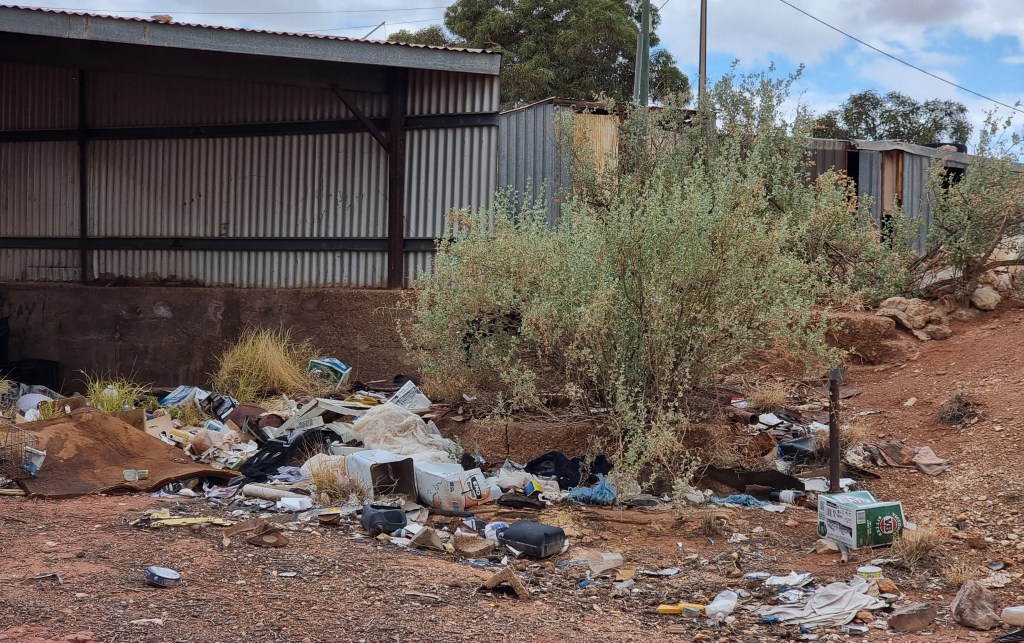According to South Australian laws relating to Alcohol: “A dry area is a place where you’re not allowed to have or drink alcohol. The purpose of a dry area is to curb alcohol-related problems and anti-social behaviour in public areas…”
Coober Pedy residents are tired of having their town used and abused by partying visitors from nearby remote communities who are not allowed to have alcohol on their own considerable land allocation, while public servants simply make the troublemakers comfortable and watch mayhem prevails in Coober Pedy’s public places.

Drinkers, party all night, and light fires without any fear of being decanted or arrested. Associated damages are no one’s responsible, but ratepayers are expected to pick up the tab for the cleanup each time. Coober Pedy is currently akin to Wilcannia through long-standing neglect of the plight of the Anangu in their own communities.
Residents that live nearer to the alcohol outlets where transients are camping say they cannot sleep at night for the shouting and fighting along with the constant sound of breaking glass.
Public servants claim that they do not have the backup of the government. Police say it is pointless to constantly move transients on or decant alcohol, as it is ongoing and they are understaffed. Gangs of transients toting open alcoholic beverages and sharing joints, roam the streets humbugging tourists and locals from as early as 9am on most days.

While being on the private property takes them out of the Dry Zone, police seem satisfied that there is no crime occurring. Locals say that welfare agencies are seen delivering supplies to the premises that transients have occupied. The tragedy here is the occupants are away and do not know that their homes have been broken into or are being trashed.
Locals are afraid that the condition of the town will impact the tourism industry among other considerations. There is no point in suggesting that we avoid publishing our plight. We must stop pretending that Coober Pedy was, or will ever be “Utopia”. We are already receiving correspondence from tourists stating that they are shocked and disappointed once they arrive here, and do not plan on coming back.
Residents wish to publicly state that they do not condone the standard of living that state government workers are implementing in our town. The state government needs to urgently attend to the dysfunction in the remote communities that is causing transients to flee their homes to run amok in someone else’s town for months at a time.
It is heartbreaking for taxpayers to discover that their hard-earned money is being allocated by the government to drugs, alcohol, gambling, and criminal behaviour. Not to mention the expenditure apparent on an army of public servants who are paid to stand by and support alcoholics while they dismantle an entire town, and volunteers clean up after all of them. The abuse of volunteers must also stop.

Coober Pedy’s streets are littered with potentially stolen, or abandoned vehicles that are smashed or set fire to as some type of protest. How long does the government expect to retain volunteers in remote areas, when most of the fires that they are called to, often in the middle of the night, are drug and alcohol-related?
This situation is Australia-wide and involves an estimated 1% of the population. Surely in light of the situation being alcohol/health related, there are steps that can be legally taken to intervene, for a better, more permanent outcome.
Let’s set out to fix this instead of benefitting from it.
Distillation of alcohol
It is illegal to use a still (of any capacity) to distil alcohol, for example spirits, without an excise manufacturer licence.
Penalties of up to $85,000 or more or two years jail can apply for distilling alcohol without a licence.
It is also illegal to buy, make, possess, or sell a still without permission from the Australian Taxation Office if it has a capacity more than five litres.
For more information, visit the Australian Taxation Office website or contact: Telephone: 1300 137 290
Fax: 1300 130 916
Email: alcohol@ato.gov.au
- Information on Stills and distillation.
- https://www.ato.gov.au/Forms/Still—Application-for-permission/
- https://www.ato.gov.au/business/excise-on-alcohol/excise-on-spirits-and-other-excisable-beverages/
The sale and consumption of alcohol
Dry areas
Liquor
- Information for parents of minors
- Delivery of alcohol
- Dry areas
- Make a noise complaint
- Object to a liquor licence application
A dry area is a place where you’re not allowed to have or drink alcohol. The purpose of a dry area is to curb alcohol-related problems and anti-social behaviour in public areas such as:
- reserves
- main shopping precincts
- car parks
- beaches and foreshores
- communities where drinking in public places is an indicator of complex social issues.
It’s not an offence to have alcohol while genuinely passing through a dry area if:
- it’s unopened and in the original container in which it was purchased from a licensed premises
- it’s in the course of carrying on a business, such as a packaged liquor sales licensee delivering a bottle/s of wine
- you live near a dry area and must pass through it to enter your home
- the alcohol is for religious purposes.
https://www.sa.gov.au/topics/family-and-community/safety-and-health/liquor/dry-areas
Categories: COOBER PEDY News & Events, GENERAL News

Thank you for your excellent coverage of an out-of-control situation that continues to get worse. As a Cleanup Australia volunteer, I will add that these alcohol abusers defecate everywhere too.
They are not homeless. They choose to leave their homes because they cannot get what they want there. Obvious solution: sell alcohol on the APY Lands.